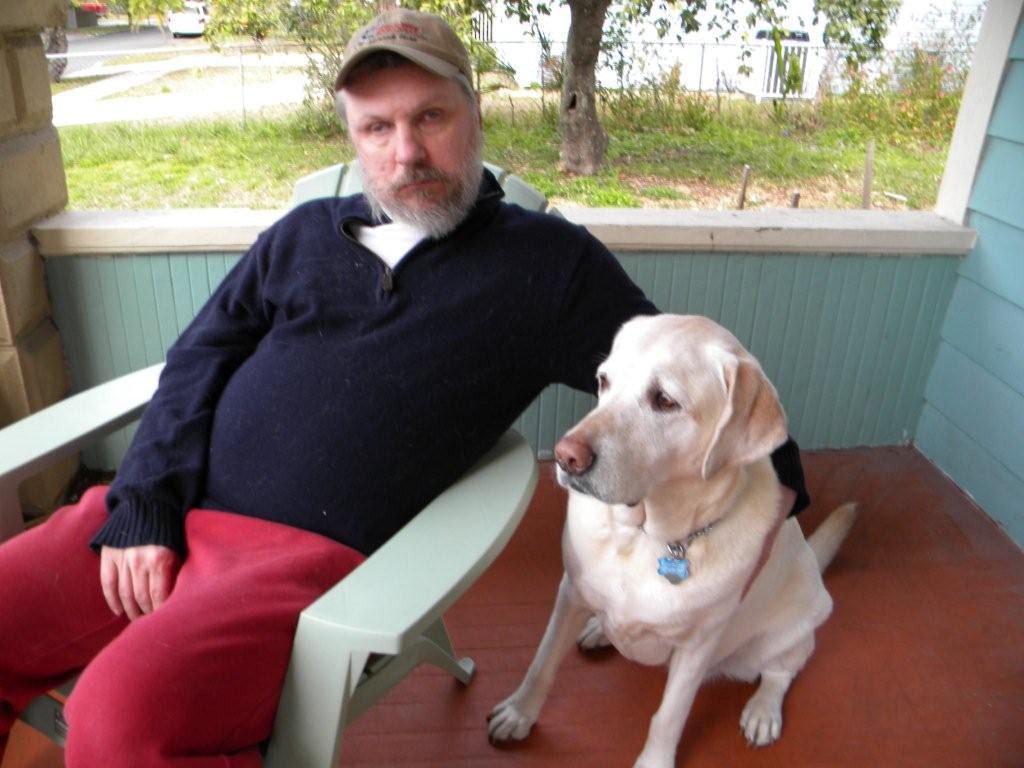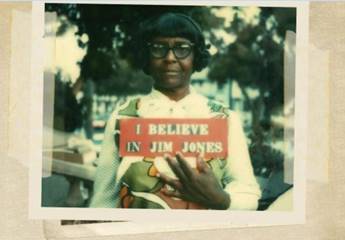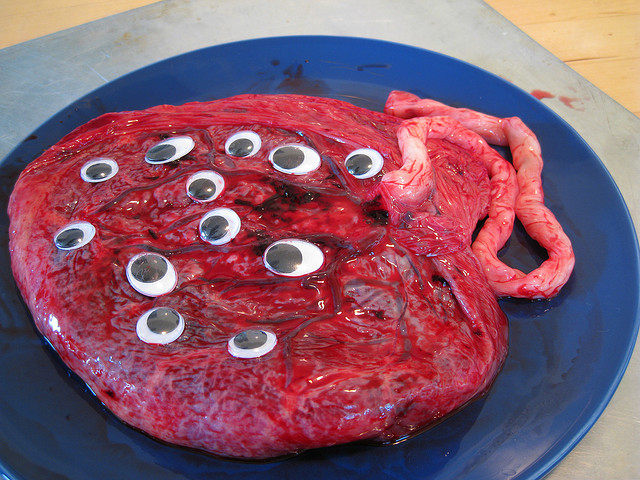Skepticism and Disability by Chris “Gonz Blinko” Hofstader

A few weeks ago, a man wrote to me asking for help in reminding the skeptical community about those amongst us with disabilities. I asked him to write a guest post, since his own words would do a better job than me. Here’s what Chris Hofstader had to say:
+++
Imagine that it is 1979. Imagine that you vocalize for a punk act and the truly hip recognize you as a regular at CBGB, Mudd Club, Danceteria and all of the other New York hot spots. Imagine that you also write creatively and involve yourself in various film and visual art projects. Imagine that the state has asked you to surrender your driver’s license. Imagine that the best ophthalmologists and researchers in the US, people at New York Eye, Ear, Nose and Throat, Massachusetts Eye and Ear and Johns Hopkins, have all told you that your vision will continue to deteriorate until you go blind. Now, imagine that a host of others offer you a cure and a way out of losing the last of your vision.
 My profound vision impairment was caused by a genetic disease of the retina called retinitis pigmentosa (RP). Even today, more than 30 years after those exciting days in lower Manhattan, there are no known cures for RP available to the general public(1).
My profound vision impairment was caused by a genetic disease of the retina called retinitis pigmentosa (RP). Even today, more than 30 years after those exciting days in lower Manhattan, there are no known cures for RP available to the general public(1).
But, when I Google “cure retinitis pigmentosa” I hear my Macintosh say that there were more than 330,000 results. All of the top advertisements and search results offer a wide variety of remedies ranging from homeopathy to acupuncture to herbs to energy healing and on and on. Back in 1979, we had no google but the alt-med crowd found me, offered me hope that I might not go blind and I swallowed the bait and got stung by the hook.
From 1979, when I was 19 until I was twenty-six, I spent a huge amount of money trying every bit of quackery that came my way. I got acupuncture, enemas, homeopathic fluids, aroma therapy, all sorts of herbal remedies, macrobiotics and more. Each time I tried something new, I was convinced that, this time, it would cure me. Each time, my hope for a real remedy was torn from me. What else could I do? All of the best mainstream doctors couldn’t heal me and it felt inconceivable that I couldn’t be cured. Clearly, mainstream medicine was conspiring against me.
In college, I majored in computer science and took a whole lot of math because I enjoyed it very much. I really didn’t, however, understand the processes of doing real research and when an alt-med practitioner presented me with “evidence” I, searching for any sort of hope, vigorously embraced it, pulled out the checkbook and got down to some sort of costly procedure with no actual improvement in my vision or slowing in the deterioration of my retinas.
Today, few people with disabilities study science and, in the case of people with vision impairment, few learn any mathematics beyond high school algebra. Few members of this community can, therefore, tell the difference between high quality peer reviewed research and the scientific sounding language used to illustrate claims that are completely bogus.
At the same time, though, many people in the community of those with disabilities, want nothing more than to become “normal” and to have the ability to see, to hear, to walk, to run, to dance or read a poem in their own voice. Many of us will grasp at anything that seems to offer hope and the alt-med world will happily take the money of any of the desperate with a few bucks in their pockets. Along with offering false hope to people with fatal diseases(2), these so-called “health care professionals” will happily victimize people with vision, hearing, mobility, perceptual and virtually any other incurable impairment.
The community of people with disabilities needs the skepticism movement even more than the population at large as we have a higher likelihood of desperately seeking a way out of the symptoms that prevent us from participating fully in the world in general. Many people involved in skepticism, including the wonderful Rebecca Watson, founder of Skepchicks, encourage me to work on issues involving bogus alt-med cures for major disabilities.
Unfortunately, there are various aspects of the skeptical movement that unintentionally prevent people with some disabilities from participating. The biggest problem is that many science and skepticism web sites have some to many problems with compliance with the standards and guidelines available for universal accessibility(3). People with disabilities ranging from vision impairment to dyslexia to hearing impairments rely on assistive technology software which, in turn, needs web sites to be as compliant as possible with the guidelines. One can make a web site 100% accessible without changing a single bit of the visual appearance of the site. No one needs to compromise their site’s functionality in any way either – following the guidelines is very easy, can be done without a lot of effort and will provide a vastly improved experience for people who use AT to access information.
Many books published by authors from the skeptical community are not available in a format that people with various print disabilities can use. This problem is shrinking a bit for people with vision impairments and dyslexia and related cognitive disorders because many more publications show up on iBooks and/or Audible.com which we can access nicely(4). Authors who do not want to discriminate against people with print impairments should insist that their publisher makes the information available in at least one accessible format. Those who want to make their book especially accessible should contact www.bookshare.org to arrange to have their book in “publisher quality” added to this online library for all people with print impairments in the US(5) who subscribe to the service.
I am working to launch a new web site(6) to specifically address issues regarding science, skepticism and disability. I will be writing about issues related mostly to vision impairment but will also cover issues regarding other disabilities as best as I can. I am looking for people with different disabilities interested in dispelling myths about disability and shining light on bogus cures and other nonsense that people sell to take advantage of people who may be desperately seeking a path to normalcy. Even if you do not self identify as having a disability but want to help on this project, please join us as this is hopefully going to be a valuable resource for a community that is now woefully underrepresented in the world of skepticism.
About the Author
Chris Hofstader has been working professionally in the world of accessibility for about 14 years. He is the author of the Blind Confidential blog – a mixture of reality and gonzo fiction regarding blindness and access technology. He currently works for the Free Software Foundation (www.fsf.org), Trace Center for Research and Development (www.trace.wisc.edu), does various contract gigs and is writing a book for a major publisher about accessibility and Apple devices. Chris is 51 years old and he has a great 6 year old guide dog named X-Celerator.
You can get in touch with Chris via the contact form on his web site or on Twitter where he is @gonz_blinko.
Notes:
(1) There are a number of very interesting science based therapies, mostly involving stem cells, in various states of trial around the world. Some of these studies are demonstrating tremendously encouraging results but we are probably at least five years from any of these being available outside of research efforts.
(2) If one uses google, they can search on the word “cure” followed by virtually any disease, including cancer, the virus and lots of other fatal conditions.
(3) There are a lot of places on the web that one can find information on making a web site accessible. The best place to start, though, is the Web Accessibility Initiative.
(4) Books published for Kindle and some other ebook services need to be explicitly “unlocked” to use the accessibility features. Without this unlocking, people with print impairments cannot read the information.
(5) Bookshare is a US based library that provides books for people with print impairment in a format that hey can use efficiently. It is US only as this is the only country that has specific copyright exemptions for people with print impairments. There may be programs similar in other parts of the world but the author doesn’t know about any in particular.
(6) Please do not look at my web site and assume that your site must be so drab to be accessible. I am building the site without any help from persons with vision but will be getting help to add photos and such relatively soon.
—





Thanks Chris for telling your story and being a voice for folk with challenges most of us have little knowledge or understanding of. I plan on re-reading this again later today.
Thanks so much for this Chris! Please do call people out (including me!) when we forget to be accessible online.
I actually have run into several students with major visual disabilities that are majoring in mathematics and computer science. In the right environment, disabled students can achieve amazing things. Example: http://www.rcpd.msu.edu/news-304
The challenge to those of us who are (for the moment) not disabled is to help build and support that environment.
My site is often criticized for it’s old-style basic look. I’ve even had snobby young college students “offer” to remake it as part of class projects (I’m being snarky because the derisive tone with which they approach me is unbelievably rude and insulting, to the point that I had to report an abusive one to his dean). I’ll concede that it’s far from the prettiest site out there. But it’s been W3C compliant since 2001 because I firmly believe that it’s better to spend my time making quality content available to all than to make prettified content available to some.
My motto: let your content be your guide.
That being said I now have a WordPress blog and have not had time to learn php coding enough to ensure that it is W3C compliant, which shames me but I chose a clean, minimalist layout and hope it works decently well. And one day I’ll get to that.
PS If any of the rest of you get as peeved about people illegally parking in disabled spots as I do, check out http://parkingmobility.com for a way to get ’em and benefit cities and charities all at the same time.
As a person with a neurological injury (genetic, untreatable) I’ve learned more about it from PubMed than from my Nurologists. I suspect they gave me the dumbed down version.
As for availability. When I find out about skeptic events I have to firgure out if I can even get to the building the event is or if there are stairs leading to the lecture hall (in which case I am screwed. Thanks to online maps the first is rather easy, but getting in touch with a contact person who understands that a 1 step stair is just as bad as a 10 steps stair when one has a movement disability can be frustrating.
Thankfully enough the local skeptics group has some guys who gets it.
I don’t know a single disabled person who hasn’t been told by an able-bodied staffer at some event, hotel, etc. that it’s all “completely accessible” just to find out that there’s a stair in the way somewhere.
Those who don’t have to worry about X do not see X all around them. This applies to the women-safety stuff, to accessibility, to food allergies, everything.
And yet when I make an effort to be clear for those who need information, I get mocked. I used to always list a blurb on playdate invitations at my house that it has no ramp access and a really annoying step at both doors. I got laughed at because there was nobody disabled in the group. The very idea that someone new might join who needs that info and doesn’t want to have to ask for it didn’t cross the mockers’ minds. I state that my donated cakes are not vegan, not GF, not diabetic-friendly, but never contain alcohol. More mockery.
Being inclusive is hard. So important, but hard. :(
Through out history, cool movements, no matter what their values, end up helping rich, educated, property owning, abled, privileged, white dudes best of all. By poking Skepticism with the Feminist stick, Rebecca’s helped to make the movement a bigger circle. You, sir, by posting this, have done the same. Thank you.
Well said. If only poking someone on FB had the same result.
Rock on, brother. I brought this up a few days ago in the thread Sam posted asking for roundtable discussion ideas. I have Duchenne muscular dystrophy, a rare and horribly deadly neuromuscular disorder, and I had an experience similar to yours just a few years ago. I would be honored if you’d let me write for you, as that is something of an interest of mine.
Thank you for writing this post Gonzo Blinko! I found it very helpful and informative. I hope this helps in making skeptics aware of what they can do to help make the movement approachable to those with disabilities. So when they are looking to alternatives they find us more appealing than the bad guys.
Excellent post! Thanks so much for writing it!
Thanks for writing in, as some of us Temporarily Able-Bodied people can forget what the world is like for the disabled. This is also Privilege.
Not that I’m an expert by any means, but on other blogs, some simple things that they have done is to caption pictures, with a description of the picture, and to make sure that all videos either have subtitles in the video or a transcript. Even as a TAB, I prefer this, because I can’t always understand what people say.
Interesting to hear your perspective. I’m also disabled. I was born severely deaf, and have relied on hearing aids since I was 18 months old. I am lucky in that as far as disabilities go, it’s a pretty “normalized” one. People usually don’t know unless I tell them (I’m sure they can guess — I miss a lot of cues in conversation, and can find it hard to interact in large social situations).
My own perspective on having a disability is that it made me MORE likely to be skeptical rather than less, though. I never went through an alt-med approach to try & find a “cure”. Might be it’s because I’ve always had it, and known nothing else, or it might be because it seemed less “cure-y”. I dunno. All I know is that being deaf made me question the religious upbringing I had (why would god be such an asshole & create disabilities?), and I came to atheism in my teens. Skepticism came much later, though.
I had never been particularly religious before I was atheist, but I was led down the Newage path and embraced a gooey spiritualism for about a year. I was more open to alt-med crap as well. I don’t know if the disabled are more credulous than other groups, but we are a large target.
Gonz, thank you so much for sharing this with us. I have yet to make my blog accessible. But I have the day off tomorrow and I will be sure to study up on it and make the necessarily changes.
I have a nephew who has his share of disabilities. In his case it’s a severe case of Cerebral Palsy. He’s only 4 years old, but he is already relying on a number of assistive technologies. I follow the news on advances in that field and find each new project very exciting.
I’m curious about whether or not your work with the Free Software Foundation involves Linux projects. That would seem like the perfect platform due to the ability to skip the GUI and low cost.
Beautiful post. Thank you for writing it.
While my areas of disability are slight, they are significant to me because they are mine. Most times it really isn’t anything to complain about, but it’s always there.
At my place of employment, I received the honor of being their experimental user for color in web pages. I’ve got the standard red/green color insensitivity that at times extends itself into the blues for some reason I’ve not worked out yet. Anyway, they use me as a cheap way to improve their color usage. There’s some wonderful tools and such that are more helpful than I can be, but for some reason they can’t beat free. I drive my co-workers crazy at times, because they’ll send me items with the font color red to make it stand out. I have to remind them over and over again, I can’t see the red in most cases. Generally they comply with my needs, but now and then I have to get forceful with someone who doesn’t see the need for my being able to see their items. For the most part, this doesn’t really bother me in life as I have always been this way and it doesn’t really hurt my daily standard of living that I am aware of.
Where I’m really deficient in is smell. I have Anosmia and as far as I know, I was born that way. For many people, this sounds like a wonderful thing because you don’t smell bad things: skunks, dirty diapers, socks …. All well and good. It also means that you can’t smell good things. Perfume makes no sense to me. I never think about it. It’s a worthless item because I can’t tell if I’ve used too much or any at all or even if it is something that is good on me. I can’t smell good things cooking in the kitchen either, which is something I’d like to do. The bad thing is, I can’t smell things that warn me of danger, like said skunk, gas leaking from my car into the passenger area enough to make people gag, smoke from any sort of fire, or food that’s spoiled. All these things have happened to me regrettably because of anosmia. Worse part is that taste is largely affected by smell. Outside of the things my tongue tells me: salt, bitter, sweet etc, I get no kick from anything. No flavor. Everything to me is base tongue type of tastes and textures. And since I was born this way, it isn’t something I really miss unless people harp on it. The good side to things is that things that aren’t so flavorful don’t bother me. The bad side is I tend to pile on salt and hot spices to enjoy things, much to the dismay of those who may cook the food. (Sorry Mom)
@ Buggi —
Woo, high-five for the fellow anosmic!
(Same here, since birth.)
I’ve never met another person with anosmia, myself. The looks I get when ‘coming out’ (I often forget to even mention it) are hilarious — it’s like telling someone you’ve never seen the sky.
I’m not sure I’d call it a disability in my own experience, but then, I don’t have anything else to compare it to.
The closest I can get to imagining what a smell might be like are those old Warner Bros cartoons with the visible ‘hand’ of steam wafting from a pie to entice Bugs Bunny. I’ve been told that’s not really what it’s like. :)
Hooray! We are not alone! *sniff*
Yah, I really don’t wish to imply that it is a real disability when talking about disabilities. There are so many ways that it will never measure up to what people go through living with their disabilities. But for me it’s the one that I know and live with and it only really makes itself known when something unhappy happens because of it.
Outside of a few dangerous moments because I couldn’t smell the fires before the smoke became obvious (I have several fire extinguishers for such things now), spoiled foods (ugh my stomach!), or sad moments when I didn’t realize my daughter needed changing and she developed a bad rash (I did not see the red either!) and the like; I don’t have a major issue with it. It’s just my world.
Thanks for the awesome article! I work in a rehab hospital and no matter how much I try to be on the lookout to help my patients find accessible resources or problem solve a task, I know I am limited by my able-bodied privilege. It is very valuable to me to hear/see the experiences, obstacles, etc. of the disabled community.
Also, it’s wonderful you found the skeptical movement. I do not have a disability but have been dealing with infertility for several years now, thankfully *after* I had found the skeptical movement. Being skeptical has so far saved me tons of time, money, and heartache from alt med recommendations such as taking ridiculous supplements or allowing someone to “massage my uterus!” Thanks again for your writing and for any insights you have to share.
I’m not sure where I stand on this. One would think it would be obvious, since I am classified as a person with disabilities in the province of my country which I post from (Ontario, Canada). Not that I disagree Hofstader-san…but at the risk of making myself vulnerable (as in disclosing personal information about myself in a forum for potential trolls and ignoramuses on the internet, who could use said my disabilities against me); I don’t have what one would call traditional disabilies. As in, I am not blind, I am not in a wheelchair and I am not developmentally delayed. I have two types of *learning disabilities (cognative based) and one type of debilitating neurosis (emotional based). But I did note that Hofstader-san used dyslexia as an exmple which is a learning disability. So I guess I am chiming in here inpart for that reason.
But also, and this maybe completely ignorant of me, I don’t want to using my disabilies as a crutch. Yes, it takes me well over an hour to formulate this posting, but I don’t want it to exclude me when I am caught making erroneous and whacky claims for example. So as you can see, I have mixed and likely confusing emotions about this subject. Other than I am most definitely on board for the rights of the disabled, since I am one. I hope this makes sense.
*Note: One thing that has bothered me about learning disabiliies, is there are some in the skeptic community that don’t believe in its existence. I remember poking at an article at Skeptic Magazine some years back where it was claiming LD’s was “all in the head.” Based on that, some may not even consider me a disabled person at all. (I personnaly thought that article was load of crap since evidence suggests it’s quite likely a real thing. But at the risk of derailing this thread, that conversion for another day.)
Thanks for your post! I am going to research some of the things you mentioned, such as making blogs/websites more accessible. It was also good to hear someone’s perspective on using alternative medicine. I feel the same desperation with some of my chronic health problems- the kind where you want to try anything to feel better. It’s sad that people prey on folks like us. Anywho, thanks again for this, and I will spread the word about making websites better accessible.
My dad is going blind slowly from something that I sadly can’t find out what’s called in english and I work with accessibility in my day job (mainly for the print disabled – people who are blind or dyslexic or for some other reason find themselves unable to read printed text).
So it’s a topic I have some interest in.
My dad has tried acupuncture and homeopathy briefly before concluding that they had no effect. In both cases, the quacks informed him that he might not experience a significant effect right away and that he’d need an unspecified number of further treatments and that helped trigger his alarm bells.
(“You’ll need to keep coming back for more treatments until we get tired of your money!”)
I’ll definitely read your website with interest – both personal and professional.
Nothing like being on crutches for five months (February to June) to learn how inaccessible New York City can be.
I think hucksters are going to target anybody they perceive as vulnerable and certainly anybody who has been struck with an untreatable/incurable disease probably looks like an easy mark. It’s our job to make sure they (the assumed targets) are not.
I just saw an article on Comic-Con’s support of disabled guests:
http://www.kpbs.org/news/2011/jul/25/comic-cons-disabled-fans/
Perhaps their staff would be willing to help other convention organizers *cough cough* make their conventions as inclusive as possible?
Chris I feel so sorry for you, after reading your story, I can’t help it. Like your Gonz blinko name and blog http://blindconfidential.blogspot.com/ wonder if you have thought about doing some podcasts. I think you’d be great as a vocalist in a band now!! in 2011 Ian dury springs to mind. http://www.youtube.com/watch?v=gBLeVcP_JQg
I’m coming into this conversation a little late because I’ve been traveling and just got home. Thanks for writing this, Chris. I like reading skepticism through the disability lens and would like to see more like this. I am deaf (since birth) and have wondered whether there are any other deaf skeptics out there (hey! to BeardofPants).
Access to information is a serious issue for us as well. Pod casts, videos and vlogs I generally can’t access. The automatic transcription thing on YouTube is a great idea, but needs a lot of work yet- nothing is intelligible. I was thrilled when NECSS provided ASL interpreters for the conference this past spring (and also last year for part of the conference).
I would be really interested to know how access to information (or lack thereof) affects skeptical and critical thinking for people with different types of access needs. Although I didn’t come to skepticism directly as a result of my experience as a deaf person, I may have had fewer opportunities to get the information I got that eventually led me here.
Keep writing! Maybe I will too.
Hey, back! :)
Yes, pod casts, and youtube videos can pose a challenge for me, too. I tend to not do podcasts, because I find I need a visual medium to help me understand what is being said (I was taught to lipread when I was little, and while I can’t do it now, I do find I need to read the cues to help me interpolate on videos). I find wearing good headphones can help, FWIW.